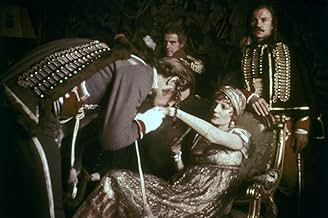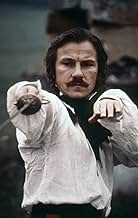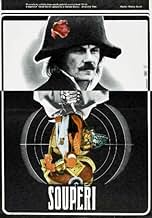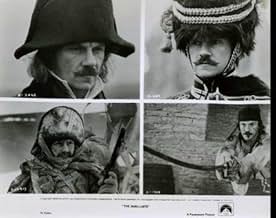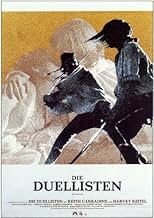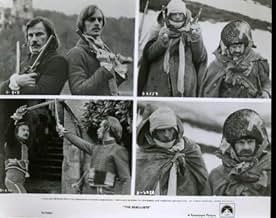France, 1801. Due to a minor perceived slight, mild-mannered Lieutenant d'Hubert is forced into a duel with the hot-headed and irrational, Lieutenant Feraud; their disagreement ultimately re... Read allFrance, 1801. Due to a minor perceived slight, mild-mannered Lieutenant d'Hubert is forced into a duel with the hot-headed and irrational, Lieutenant Feraud; their disagreement ultimately resulting in scores of duels spanning several years.France, 1801. Due to a minor perceived slight, mild-mannered Lieutenant d'Hubert is forced into a duel with the hot-headed and irrational, Lieutenant Feraud; their disagreement ultimately resulting in scores of duels spanning several years.
- Director
- Writers
- Stars
- Nominated for 2 BAFTA Awards
- 2 wins & 4 nominations total
- Director
- Writers
- All cast & crew
- Production, box office & more at IMDbPro
Featured reviews
The Duellists was based on a tale by Joseph Conrad (who inspired Apocalypse Now and the ship names for his 1979 feature, Alien - Nostromo and Narcissus).
As you my expect from Ridley, every scene looks gorgeous and is obviously the mark of a man moving from 30 second promotional films into the big screen world.
Harvey Keitel (later to star in Thelma and Louise) and Keith Carradine are the Hollywood stars acting alongside a wealth of British thesps including Albert Finney, Diana Quick, Tom Conti, Pete Postlethwaite and Veronica Quilligan (later to play the innocent protagonist of Neil Jordan's Angel).
The movie is clearly inspired by Stanley Kubrick's Paths of Glory and Barry Lyndon and looks like a dry run for Gladiator's battle scenes.
It deals with the themes of honor, obsession and violence. Needless to say, the futility of war and the destructive nature of revenge leads to the twist that both men have been duelling for so long, in the end they actually forget what it was that set them off on their feud.
The duels are stunning, the attention to detail is meticulous and the movie won a string of awards, including 'Best Debut Film' at the 1977 Cannes film festival.
Top trivia
* The budget was so tight that Scott was forced to use producer David Puttnam and other crew members as extras.
This was an extension of his earlier short films, a potted version of Paths of Glory in which a handful of extras (including Tony Scott) go over the wire and run round the camera before repeating the exercise. Smoke and editing hide the fact that there were so few people involved.
*The Duel, as it was originally called, was to be made for French TV as a one-hour film.
*The scene where the French army is bogged down was shot in a ski resort near Inverness.
*After EMI turned down the script, Scott flew the project to Chicago and the company Hallmark...
*After the French deal collapsed and the $700,000 budget proved too rich for Hallmark's blood, one of the bosses saw its potential as a film and suggested that Scott try and make it as a movie.
*The eventual budget was a mere $900,000. Scott clinched the dealing by telling Paramount he would put up a completion bond and that he would start pre-production on the day of the meeting. He would start shooting within a couple of months.
The thought of filming a movie like that in September left the suits slack of jaw.
In the sun-kissed world of la la land, making a Joseph Conrad movie in Winter sounded like a nightmare.
*Scott had originally wanted to make a Western but lacked the cash to fly off to Monument Valley and the locations of other such classic John Ford Westerns.
And the immersive world. Scott usually aims for this, and this is from a time he did it well. He takes from Kubrick the idea of natural light that, once the camera locks in, will look and move (and slightly breathe) like a Romantic painting. The era is Napoleon's, and at least the wintry march back from Russian defeat provides opportunity for some astonishing images.
Some words exhaust their meaning, when thrown without care; so it's not enough to call this existentialist. The story is that an army officer bears an inexplicable grudge that spans 20 years and half of Europe.
Everything you need to know is in the last scene, expertly executed. The idea is that something deeply not-logical gnaws and eats at man's soul and sniffs for blood. And that men, this is strictly male, have lived with this aspect of self for so long, we have developed separate not-logical tools that allow us to not only instinctively respond to the call, however reluctantly, and in spite of recognition of how insane it is, but to silently respect and defend it as its own kind of logic (in our case, the concept of honor).
In the last scene, we have two men seeking each the other to eliminate him from existence, as simple as that. It's the oldest game men have played, and the same thrill resurfaces across poker tables and football. It's got to have something of death in it, if it is to matter at all.
And I have a book called Bushido: The Soul of Japan here with me, retrieved from a shelf because the film sparked an interest, that explains how the blade is the samurai's extension of soul and imbued with the same discipline.
The two rivals have fenced for the entire film, but settle on pistols for the deciding duel, and wander about in a forest, two shots each, meaning they will be able to instantly discharge what is in their soul.
Each man in the shot he takes reveals who they are, one of them rash and impertinent, and fires first, they other level-headed and reserved. The subtle context of the scene is that politics do decide war from afar, in our case the slippery (faulty) pair of boots of the aristocratic boot-maker.
Which is, in a third level, a beautiful way of putting the subtle discord strummed by the universe that creates a slippery world and illogical selves of us, dumb chance as fate.
And suffice to say, the film is British, so you will not learn it here, but in spite of the probably British-started legend, the French are historically the best tactical warriors in Europe. There is a reason why nearly every word in the modern lexicon of war is originally French, and that includes honour.
It deals with the mores and prejudices of the time it was made. The costumes are done without attention to detail or the hair-styles of the leading actors don't belong to the time when the movie is supposed to be taking place.
Not this movie.
It deals with timeless themes: courage, fate, inevitability,
honor. The costumes are impeccable, and even the hair-styles change as time progresses, exactly as the fashions changed during the times of the Napoleon. Without knowing the actors (though the cast is composed of excellent, justifiably famous artists), there is no way to tell it was made in 1977. It might have been made yesterday, or it might have been filmed on the spot.
If you enjoy a movie where attention was paid to every detail to make it a true piece of art, if you enjoy dramatic photography thoughtful themes, and just the barest suggestion of dry humor, this is the movie for you.
What sets this film apart (beyond its sheer visual gorgeousness) is its unremitting humanity and realism. Carradine as the protagonist is a decent enough, reasonable enough chap trying to live by an unreasonable and inflexible code. Keitel as Feraud is a cipher: charged with a wholly unreasonable hate the sources of which we never see. The movie steps through the ups and downs of war, fashion, politics. Though the film's structured around a series of violent combats, the struggle is finally a moral one. One man finally transcends the ideal of honor that's kept him a prisoner for fifteen years. The other is unable to.
This is a movie to watch, and to recommend to one's friends. It's lamentably not available yet in DVD, but can be found occasionally as a rental. Watch it for the costumes, the lighting, and the gorgeous camerawork. Watch it again for a movie that takes on The Big Issues. Brilliant.
Did you know
- TriviaSir Ridley Scott said that after having directed anywhere from 1,500 to 2,000 television commercials, he realized no one was going to approach him about directing a film, so he'd have to take the lead. Since his funds were limited, he used a public domain source for the story, and commissioned the script for this movie on his own.
- Goofs(at around 1h 23 mins) Faraud, loading his pistol, drops a ball into the barrel and then rams it into place. When the ball drops,a metallic sound is heard, indicating that there is no powder in the barrel.
- Quotes
Armand D'Hubert: General Feraud has made occasional attempts to kill me. That does not give him the right to claim my acquaintance.
- Crazy creditsOpening credits prologue: STRASBOURG 1800
- ConnectionsFeatured in Moviedrome: Double Bill - The Duellists/Cape Fear (1991)
- SoundtracksBist du bei mir
(uncredited)
Music by Gottfried Heinrich Stölzel
from "Notenbüchlein für Anna Magdalena Bach No. 25. BWV 508"
Written by Johann Sebastian Bach (uncredited)
Details
- Release date
- Countries of origin
- Languages
- Also known as
- Duellistes
- Filming locations
- Château de Commarques, Dordogne, France(final pistol duel)
- Production companies
- See more company credits at IMDbPro
Box office
- Budget
- $900,000 (estimated)
Contribute to this page




